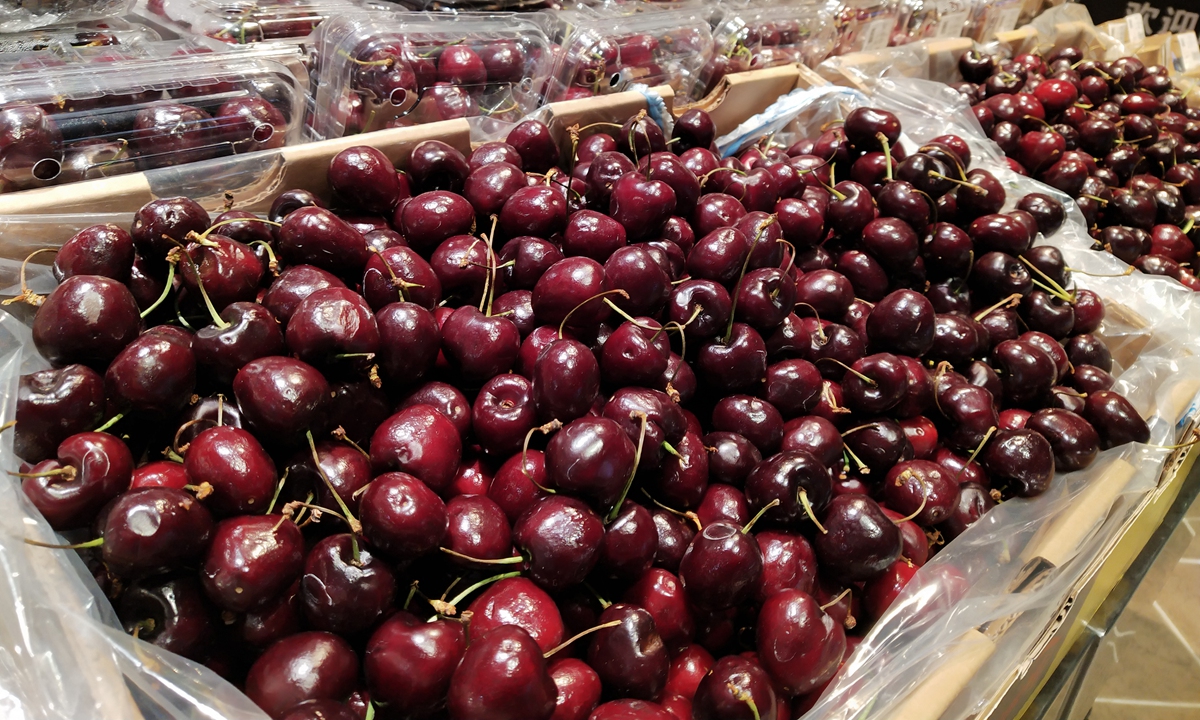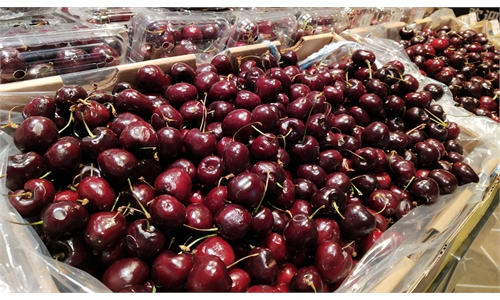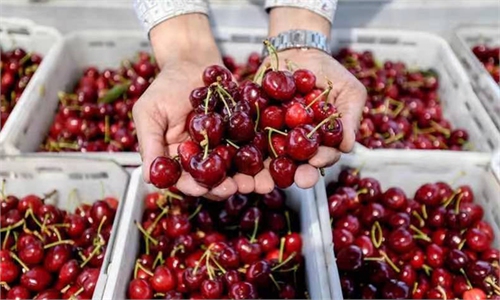COVID-19 panic to destroy Chinese consumers’ hard-earned ‘cherry freedom’: importer

Chilean cherries Photo: IC
Merchants of imported cherries say demand has plummeted over mounting consumer worries after samples of imported cherries were found to be COVID-19 positive.
It is feared that this could lead to a new round of price reductions of the expensive fruit amid growing concerns over COVID-19, say Chinese cherry dealers.
An imported cherry dealer surnamed Pan told the Global Times that trade for imported cherries has come to a standstill after inner packaging of a batch of imported cherries was found to be COVID-19 positive in Wuxi, East China's Jiangsu Province, on Friday.
"Many consumers have found themselves in a dilemma after inner packaging tested positive for COVID-19. The price for retail has sunk to a historical low of 20 ($3.09) yuan per half kilogram. However, this still hasn't brought many sales," Pan said.
He estimated that there are at least 6,000 containers of unsold imported cherries in China, which could be a huge loss to the overseas cherry farms and domestic importers if consumers remain wary of the imported fruit.
It is not yet clear what the source country is, but the COVID-19 positive result has raised much discussion among Chinese consumers over the origin of the fruit on Chinese social media.
Most of the cherries sold in China come from Chile and Australia.
In relation to the recent news shared on different social networks and media publications in China, the Embassy of Chile in China said it has, to this date, not received any official communication from the General Administration of Customs of China or any other official Chinese authority certifying that the finding referred to the news is a product imported from Chile.
"Therefore, as this situation has not happened, we deny that these cherries are from Chile," said the Embassy in a statement sent to the Global Times on Sunday.
According to the Embassy, around 130 million kilos of cherries have been exported from Chile to more than 400 million consumers in China during this season.
Australia exported 1,487 tons of cherries to China in 2019. This represents a drop of 7 percent year-on-year from the 2018 debut season, media reported.
In 2019-20 season Chilean exports were over 150 times Australia's and pricing was lower, according to data from Australian Trade and Investment Commission.
Imported cherry prices sunk 20 percent resulting from an oversupply as exporters eye a rebound in Chinese consumption amid the COVID-19 pandemic, according to an earlier report from the Global Times.
The sudden price drop had made many consumers excited that they were finally able to reach "Cherry freedom" - a buzz word about the ability to purchase pricey imported cherries without a second thought.
However, the newly found presence of the virus on the surface of the fruit has presented a dilemma to many consumers.
"I really don't know what to do with the imported cherries I bought for 169 yuan. I want to eat them, but I'm afraid. It's a pity to throw them away," commented an internet user on China's Twitter-like Sina Weibo.
"I love eating imported cherries but have stopped buying the fruit following the news. It is not necessary to put yourself at risk just to enjoy a certain type of fruit," a Shanghai based consumer surnamed Wang told the Global Times on Sunday.
Others seem to have reacted calmly to the news.
"After the first imported food has tested positive for COVID-19, we should know that any product imported from abroad could carry the virus. It is a rare oddity," a Shanghai based consumer surnamed Zhang told the Global Times on Sunday.
The positive COVID-19 result on imported food does not necessarily mean that they are infectious. It depends on the level of the viral load and whether the contaminated virus is active, Feng Zijian, deputy director of China Center for Disease Control and prevention said.
Feng stressed that for consumers, imported fruits generally do not cause infection, and can be safely consumed after cleaning.
"The next week will be crucial. It is hoped that the customers can be rational toward the imported cherries," Pan said.


